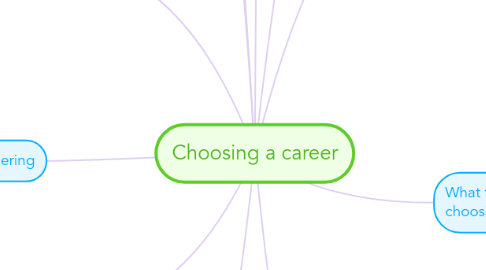
1. Reference of source: Student recruitment video [Video]. (2015). Perth, Australia: ECU.
2. Reference of source: ECU, 2015. Tutorial 5: Edith Cowan University Careers and Leadership Services [Lecture notes]. Retrieved from Blackboard website: https://blackboard.ecu.edu.au/bbcswebdav/pid-3728541-dt-content-rid-4192962_1/courses/UPU0001.2015.1.OFFCAMPUS_ES/Careers%20and%20Leadership%20ppt.pdf
3. Career development checkpoints
3.1. 1st year student
3.1.1. Access the ECU Career Hub
3.1.2. Attend career workshops
3.1.3. Join student clubs
3.1.4. Gain work experience
3.1.5. Build self-awareness skills
3.1.6. Sign up for the ECU volunteer program
3.2. 2nd year student
3.2.1. Research preferred job industry
3.2.2. Research work opportunities
3.2.3. Develop networking skills
3.2.4. Develop communication skills
3.2.5. Build professional network
3.2.6. Sign up to ECU peer mentor program
3.3. 3rd year student
3.3.1. Attend career fairs
3.3.2. Attend employer presentations
3.3.3. Obtain graduate program information from ECU
3.3.4. Update CV
3.3.5. Work on interview skills
3.3.6. Get involved in leadership programs
4. Networking
4.1. What is networking?
4.1.1. Connecting with other people
4.1.2. Creating professional contacts
4.1.3. Working with contacts on their needs and wants
4.1.4. Sharing information
4.1.5. Creating opportunities for yourself and others
4.2. Examples of online networking
4.2.1. Professional associations (check for student opportunities to join.)
4.2.2. Facebook and other social media sites
4.2.3. Discussion boards
4.2.4. Blogs
4.2.5. Own website
4.2.6. Linkedin
5. Internships
5.1. What is an internship?
5.1.1. Defined by the National Experiential Education as "a carefully monitored work or volunteer experience in which an individual has intentional learning goals and reflects actively on what he or she is learning through the experience".
5.2. Benefits
5.2.1. Develop workplace skills
5.2.2. Professional networking
5.2.3. Gain a competitive edge in the job market
6. Volunteering
6.1. Benefits
6.1.1. Sense of pride and accomplishment
6.1.2. Giving back to the community
6.1.3. Create new contacts and friends
6.1.4. Pursue a passion
6.1.5. Gain experience to add to your CV
6.2. Volunteering at ECU
6.2.1. Register interest through ECU Career Hub and attend ECU Volunteer Induction Workshop
7. Peer Mentoring Program
7.1. 1st year student
7.1.1. Join the program to be given a peer mentor
7.2. 2nd or 3rd year student
7.2.1. Join the program to become a mentor
8. How to apply for a course at ECU
8.1. Access SIMO system through the ECU website
8.2. Apply for course on SIMO. You may need to attend an interview or attach a portfolio
8.3. Cannot be offered a placement until you are done with UniPrep course exams
8.4. Note: 50% average score overall from UniPrep gives you a notional ATAR of 70; achieve an average of 80% or more and you may be eligible for an ATAR of 80
9. What does the ECU Career and Leadership Services provide?
9.1. Provide students with support in their career journey
9.2. Career advice
9.3. Provide information on volunteering opportunities
9.4. Mentoring programs
9.5. Leadership programs
10. What to consider when choosing a career
10.1. Your skills
10.1.1. Teamwork
10.1.2. Problem-solving
10.1.3. Computing
10.1.4. Organising
10.1.5. Communication
10.2. Your interests
10.2.1. Creative
10.2.2. Social
10.2.3. Outdoor
10.2.4. Scientific
10.3. Your location
10.4. Your qualifications
10.5. Your contatcs
10.6. Your personality
10.6.1. Determined
10.6.2. Cautious
10.6.3. Outgoing
10.6.4. Calm
10.7. Values and motivation
10.7.1. Work-life balance
10.7.2. Helping others
10.7.3. Money
10.7.4. Security
11. How to manage your career
11.1. Self awareness
11.1.1. Through your interests, strengths and values
11.2. Exploration
11.2.1. By researching potential occupations and job industries
11.3. Decide
11.3.1. Evaluate the job research and your own career goals
11.4. Do
11.4.1. Create an action plan to reach your career goal
12. Sties to use to research potential careers
12.1. www.myfuture.edu.au
12.2. www.joboutlook.gov.au
12.3. www.careerfaqs.com.au
12.4. www.graduatecareers.com.au
12.5. www.graduateopportunities.com
12.6. www.jobguide.det.gov.au
13. CareerHub
13.1. What is it?
13.1.1. "Careerhub is an internal Career Development Management system which Universities around Australia use."
13.2. Benefits
13.2.1. Provide self-research career and employment information
13.2.2. Resume and cover letter templates and information
13.2.3. 1:1 career appointments
13.2.4. Job vacancy advertisements
13.2.5. Traineeship and internship advertisements
13.2.6. Potential employer information and contacts listing
13.2.7. Career events
13.2.8. Access to employment articles
13.2.9. Access to self development articles
13.3. Contact CareerHub
13.3.1. Website: www.ecu.edu.au/careers
13.3.2. Email: careers@ecu.edu.au
13.3.3. Phone: (08) 6304 5899
